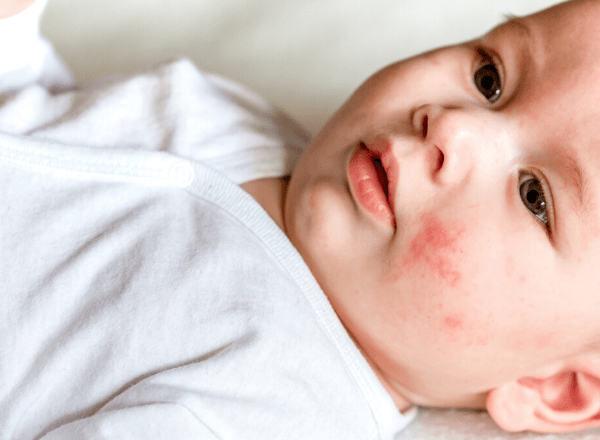Eczema (atopic dermatitis) is a non-infectious skin condition. It affects the topmost skin layer by making it dry, itchy, and rashy. Mostly, it affects infants and the condition keeps changing as the baby grows. However, it also affects adults but in rare circumstances.
Causes of Eczema.
Eczema is a result of genetic factors from both family histories. More so to those with allergies that result from dust or pollen grains or even asthmatic individuals. It can also result from environmental factors where the baby is residing. Eczema inhibits the skin from holding moisture hence making it dry.
Some environmental conditions such as stress-related issues among the pregnant mother can cause eczema. Expectant mothers need a calm environment to enable them to deliver a healthy child. Air pollution is also a leading factor in eczema conditions. When the levels of lead, carbon monoxide, and ammonia are high, they affect the surrounding environment of the growing baby. This leads to the skin drying up due to lack of enough moisture.
Symptoms of Eczema.

The baby’s skin has rashes that are bumpy and might discharge some fluid. Rashes also make the skin dry, itchy, and more scaly.
The areas of the body are darkened especially on joints. For instance, the elbow joints, knee joints, ankle joints, and armpits area among others. Beneath the eyes and behind the ears are darkened compared to other parts of the body. Also, around the mouth, the area appears darker than it should be. Moreover, swelling on the most affected body parts might be experienced in severe circumstances.
Eczema mostly dominates the cheeks, forehead, and scalp. This happens since those are the most exposed parts of a baby at their tender age. The diaper area is also affected, especially with the increased warmth that comes as a result of too much heat concentration.
During the crawling stage in infants, eczema dominates the elbow and joints as that’s where most movements occur. So it may lead to an infection from the pus that comes out and get to contact with the uncleaned surface. Therefore, it is advisable to ensure that your baby crawls on a clean surface. It helps in avoiding such severe instances of wounds and bad infections.
- Jamie Foxx bio-age, children, wife, career, net worth.
- Katy Perry age, education, husband, children, career, movies.
- Jose Mourinho age, childhood, wife, children, career, Net worth
- Paris Whitney Hilton Bio, Age, Height, Career, Family, Net Worth
- Leonardo DiCaprio Age, Father, Wife, Movies, Net Worth
- Ian Ziering age, family, wife, children, movies, attack, net worth.
- Erika Gonzalez bio-wiki, age, children, husband, net worth.
Treatment.
There’s no treatment for eczema but instead suggests ways of managing dry and scaly skin.
Recommended ways to manage Eczema
- Use lukewarm water during bathing so as to avoid skin peeling, and use soft washcloths during the entire process.
- Avoid using scented products on both baby’s skin and the clothes they wear.
- Using moisturizing soaps such as Dove soap, Bennet’s soap, and Dettol even tone among others.
- Using Moisturing creams such as Epimax Baby and junior cream, Baby Dove cream, Bennet’s cream, Aveeno, Cetaphil.
- Keep the baby’s nails short always to avoid causing more scratches on affected areas.
- Ensure the house/area around the baby is dust-free.
- Babys’ clothes should be made of soft cotton material.
- Dress the baby warmly and avoid clothes that are too heavy due to sweating.
- If the condition is severe, the doctor might recommend the use of antihistamines, antibiotics, or antifungal drugs due to skin infections.
- Mount Kenya University history, fees, courses
- Kenya Institute of special education, courses.
- List of Best private secondary schools in Nairobi County.
- Egerton university, fees, location, courses.
- Kenya Medical Training College, courses, requirements.
- Best Public High Schools in Kiambu County.
- A list of special secondary schools, and contacts.